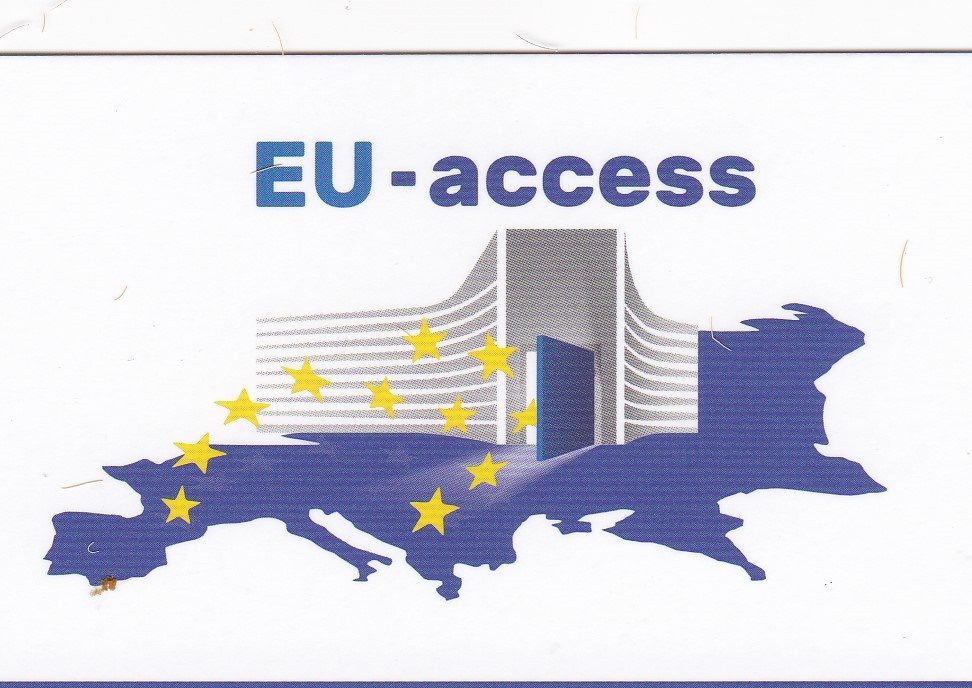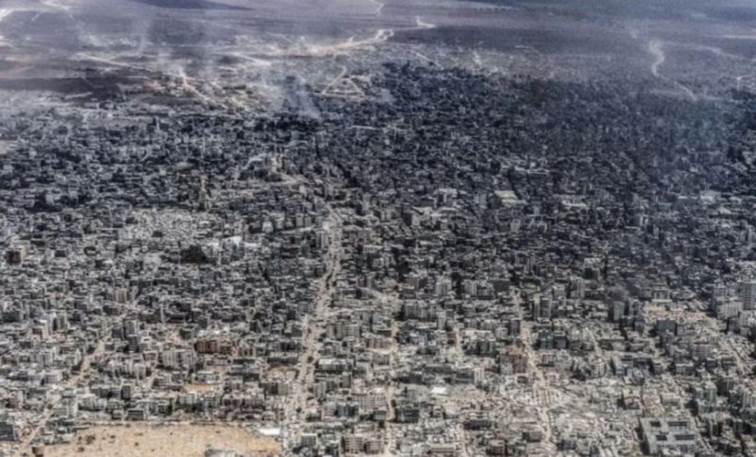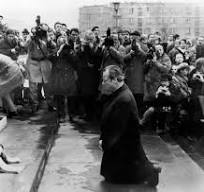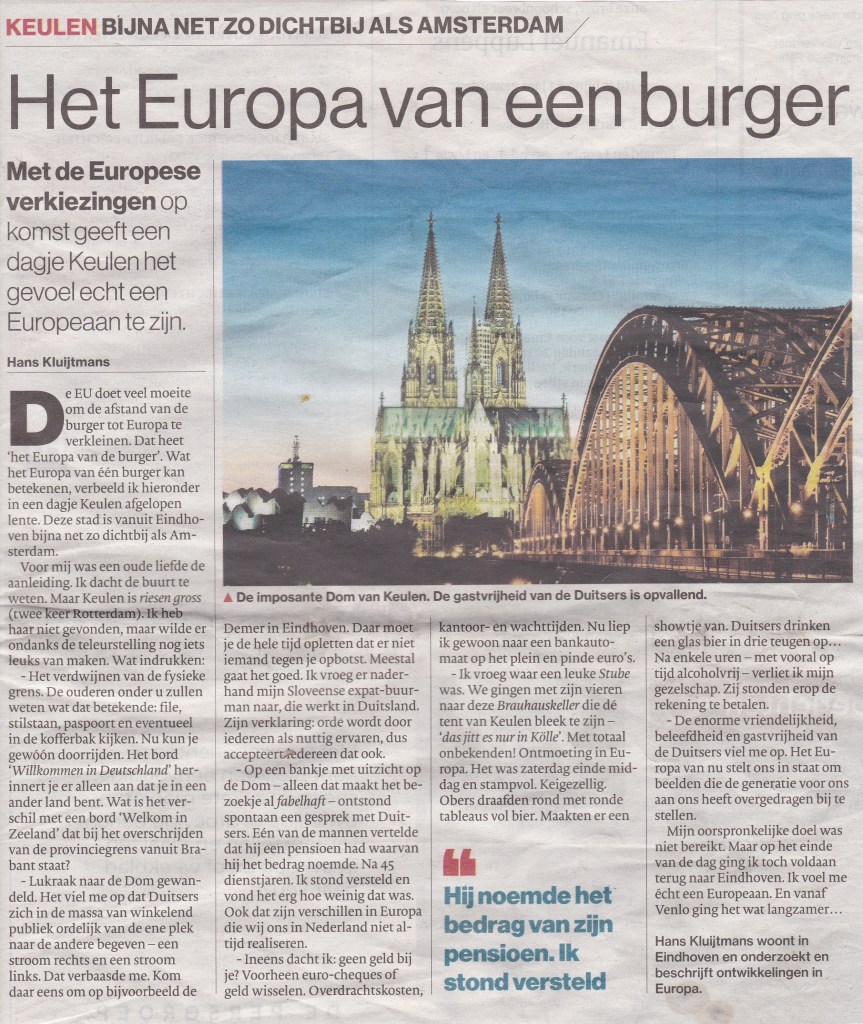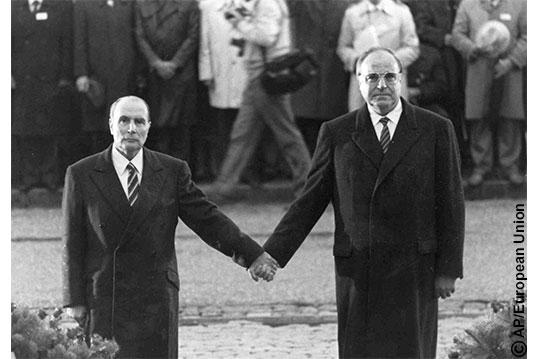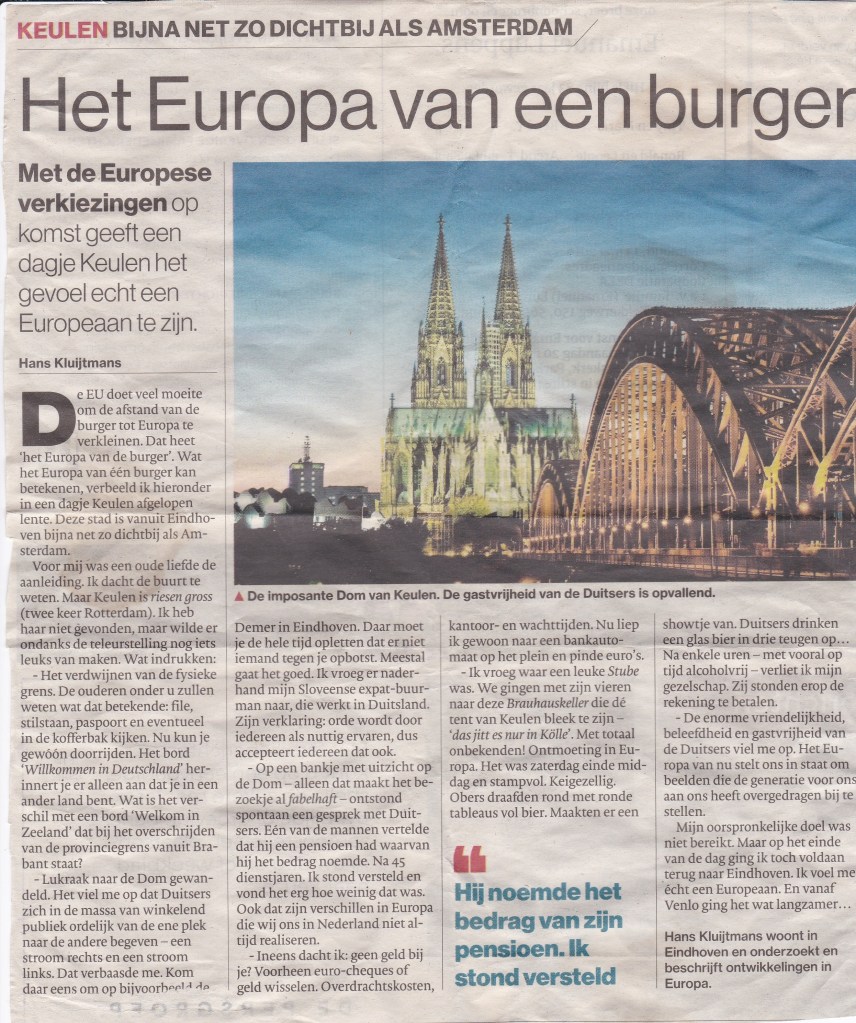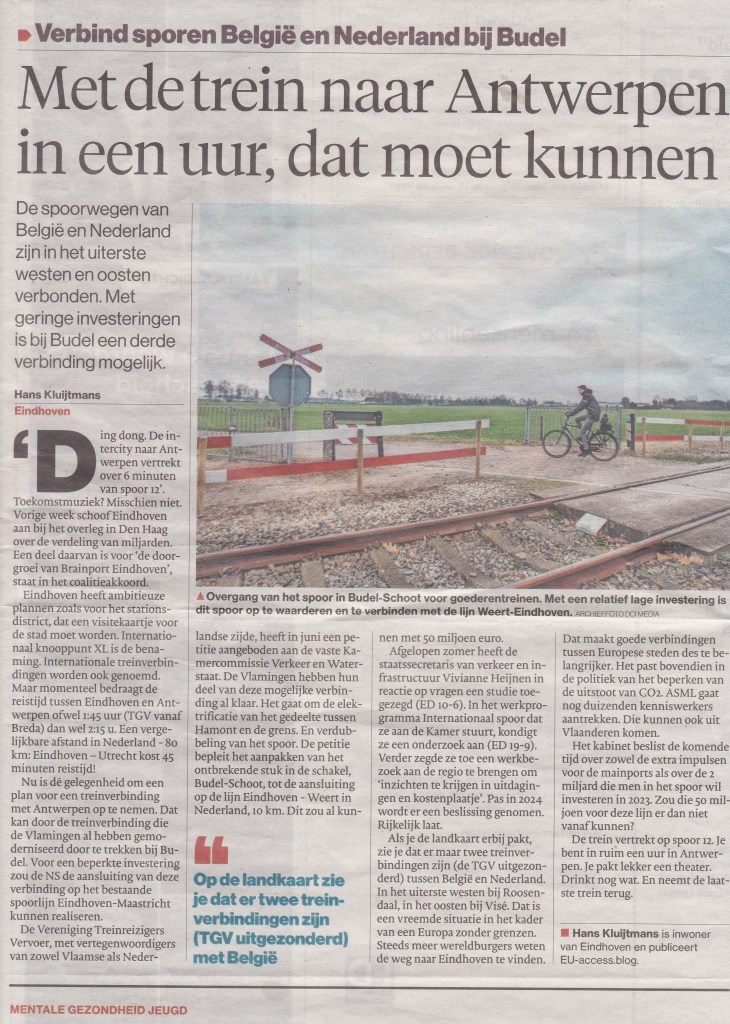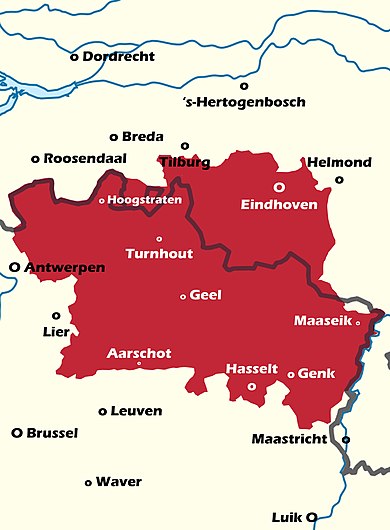De verkiezingen voor de Tweede Kamer op 22 november was een énorme proteststem.
Zoals gebruikelijk zaten de opiniepeilingen er weer lelijk naast.
Je vraagt je sowieso het nut is van deze peilingen af. Ook nu, buiten het verkiezingen ‘seizoen’ wordt er weer driftig gepeild. Ik denk dat dit ook aan de hijgerigheid van de politiek bijdraagt, want politici zijn er vaak wel gevoelig voor. Ik zou zeggen: ophouden met die peilingen buiten het seizoen. Wat is het nut ?
Niemand had de enorme verkiezingswinst van de PVV van Geert Wilders voorzien.
De weken na de uitkomst duikelden opinie-makers over elkaar heen in hun verbazing.
Ik had het ook niet verwacht. Ik liep na het stemmen met een dame richting de Appie.
We raakten aan de praat. Zij had ook een volmacht van haar partner.
Ze moest dit keer geen PVV stemmen want die stem was toch verloren, maar NSC of
VVD. Ze mocht volgens mij kiezen. Ik zei “dat is een wolf in schaapskleren”, die Wilders.
Wat gisteren ook een door de NOS geïnterviewd VVD-lid aan het partijcongres zei.
Maar ik denk er nu toch anders over.
Wat hebben we gemist, dat deze daverende overwinning niet gezien is ?
Ik merkte in vele reacties op zijn overwinning ook weer het dédain, over deze partij.
Ik heb daar ook aan meegedaan, maar ben er toch anders over gaan denken.
De laatdunkende houding van ‘gevestigd Nederland en Den Haag’ leidt er álleen maar toe
dat de stemmers op de PVV zich nog meer onbegrepen en ongezien voelen.
En dát is het punt. Vele burgers voelen zich niet meer begrepen en gezien.
https://nos.nl/nieuwsuur/artikel/2498965-vanavond-op-tv-pvv-grote-winnaar-van-de-verkiezingen.
Kijkt u eens naar het interview dat Jeroen Wollaars had met Arjen Noorlander, politiek duider. Vanaf minuut 8:37.
Naast immigratie, wat het punt van Wilders is waar hij niet over wil onderhandelen, zijn er een aantal opmerkelijke thema’s die de PVV-stemmer belangrijk vindt.
- De kosten van levensonderhoud.
- De betrouwbaarheid van de overheid.
Bijzonder is het ook dat de huidige boerenprotesten in de hele Europese Unie rondom deze
thema’s centreren. De boeren zijn boos over de prijzen voor hun producten, en ten tweede
over de regeldruk van Brussel, cq de nationale hoofdsteden.
- Rondom de Oekraïne crisis zijn de energieprijzen sky-high gestegen. In het kielzog daarvan gingen alle kosten, zoals levensmiddelen, de zorg, bouwprodukten, etc flink in prijs omhoog.
2. Dit thema zou je kunnen vertalen als ‘de overheid levert niet’.
De overheid levert niet
De toeslagenaffaire bracht aan het licht gebracht dat het functioneren van overheidsdiensten structurele mankementen vertoont.
De regering staat aan het hoofd van de ambtelijke diensten. Zij is politiek verantwoordelijk voor het reilen en zeilen van deze diensten.
Dat vereist dat de politiek ‘grip’ heeft op de ambtenarij. En dat vertoont manco’s.
De overheid staat teveel op afstand van de burger. Dat voelen veel van die burgers.
Veel van deze problemen zijn terug te voeren tot de jaren negentig, in de kabinetten Paars.
En heeft zich voortgezet in het eerste decennium van deze eeuw.
Er kwam lastenverlichting voor de burger en meer ruimte voor het bedrijfsleven.
Het neo-liberalisme.
De overheid heeft wat betreft de publieke diensten:
- Bezuinigd;
- Geprivatiseerd;
- Gedecentraliseerd.
- De belastingdienst is een voorbeeld van het eerste.
Tevens is daar, evenals in andere departementen, job rotation ingevoerd.
Eén van de directeuren van de Dienst Toeslagen van de belastingdienst verklaarde, toen hij door de parlementaire onderzoekscommissie Toeslagenaffaire werd ondervraagd,
dat hij “buikpijn” had over de kwestie. Hij had echter inmiddels al een andere functie in het departement.
2. De overheidsdiensten die geprivatiseerd zijn, kennen we allemaal. Het zijn er veel.
De post, de energiebedrijven, telecom, het water. De zorg. Het openbaar vervoer en niet
te vergeten (deels) de woningmarkt.
Vroeger noemden we dat nutsbedrijven. Een nutsbedrijf is een bedrijf dat opereert in een sector dat in een openbaar nut voorziet. Energie, water.
De bedoeling was dat door concurrentie de kosten lager zouden worden, en de dienstverlening in een competitieve sfeer beter. Dit alles is niet gebeurd.
De premies in de zorg zijn na de afschaffing van het ziekenfonds méér dan vertienvoudigd.
We kunnen ons in alle gemoed afvragen of dit wel zo’n goed idee is.
Moet je diensten die in een publiek (openbaar) nut voorzien, wel in private handen leggen ?
De zogeheten markt is ook niet geheel vrij. Je zou het best een oligopolie kunnen noemen. Zowel in de energie- als zorgsector zijn er enkele grote spelers die de markt bepalen. In de energie zijn dat Essent, Eneco en Vattenfall.
De zorgmarkt wordt overheerst door enkele hele grote concerns als Achmea en Menzis.
De ‘groten’ bepalen in grote mate de tarieven.
De liberalisering van de woningmarkt heeft ook de nodige excessen opgeleverd.
Niet voor niets probeert de overheid weer meer grip op de sector te krijgen.
Vroeger had je volkshuisvesting, niets mis met deze term.
Sinds de woningcorporaties ook mochten gaan ondernemen, is vastgoed wellicht
van meer betekenis voor hen, dan het verhuren van hun panden.
Commercieel huren is bijna niet meer te betalen.
Ik denk dat de ‘schuld’ ook deels in ‘Brussel’ ligt. Als onderdeel van de gemeenschappelijke markt, moesten ook de diensten geliberaliseerd worden. Dit centreert in de jaren negentig van de vorige eeuw. Toevallig of niet de tijd van het neo-liberalisme in Europe. ‘Blair’.
Na de ‘Wende’ in Oost-Europa werden meer dan tien Oost-Europese landen lid van de Unie.
En ook zij moesten hun diensten ‘vrij’ maken. En het is niet voor niets dat in deze landen die meer dan 40 jaar onder het communistisch bewind vertoefden, weerstand kwam tegen deze
stap, die voor hen als een achteruitgang werd gezien.
En verklaart waarom er steun kwam voor ‘revanchistische partijen’ als de PiS in Polen en
de Fidesz van Orban in Hongarije.
3. Gedecentraliseerd zijn drie wetten.
De participatiewet, de wet op de Jeugdzorg en de WMO.
Doel was om dichter bij de burger te staan, maar het was ook een verkapte
bezuiniging.
Na meer dan een decennium kan wel gesteld worden dat deze drie wetten allemaal of in ieder geval deels op een mislukking zijn uitgedraaid. De wetten zijn achter een bureau in Den Haag bedacht maar werken niet in de praktijk. De participatiewet ging uit van ‘wens’ gedrag van de burger die daar in de praktijk niet aan bleek te voldoen.
De jeugdwet wou ook zorg dicht bij de jongere brengen. Maar veel van de problematiek is dermate complex dat zeker kleine gemeenten daar niet aan kunnen beantwoorden.
Inmiddels is die wet al weer voor een deel bijgesteld, omdat expertise alleen in grotere gemeenten beschikbaar is.
De WMO wordt als bureaucratisch en moeilijk toegankelijk gezien, terwijl toegankelijkheid juist de opzet was.
Ik probeerde in Eindhoven iemand van een beleidsteam te bereiken.
Je krijgt dan een algemeen toegangsnummer van de gemeente. Je wordt binnen twee
werkdagen teruggebeld. Het beleid staat op afstand. Zo wordt je wel de lust om contact te krijgen met een ambtenaar ontnomen.
Je krijgt in het algemeen een call center aan de lijn. Mensen die van toeten noch blazen weten. En jouw vraag cq klacht doorgeven. Beleid – aanspreekpunt staan ver van elkaar.
Kun je de kwestie na enkele dagen wéér verwoorden.
Dit probleem is overal in het overheidsapparaat. ‘Met de rug náár’, in plaats van ‘vóór de burger’.
Een tweede issue is de zogeheten job rotation. Ergens heeft de opvatting in HR-beleid postgevat dat het goed is als ambtenaren om de 3,4 jaar van baan veranderen. Zo wordt de persoon veelzijdiger, en flexibeler.
Dit gaat wel ten koste van de vakdeskundigheid. Die gaat verloren. Tevens wordt een vast aanspreekpunt gemist. Wie is er verantwoordelijk ?
Samengevat kan worden gezegd dat het overheidsapparaat, dat er zou moeten zijn ten dienste van de gemeenschap, ten dele niet goed functioneert en niet bereikbaar is voor de burger, de klant.
‘The geography of discontent’
De Europese Commissie heeft een onderzoek uitgevoerd naar regionale ontwikkeling
en de steun voor euro-sceptische partijen in Europa. Het eerste is in 2018 uitgevoerd. Dit betreft een vervolgstudie.
https://ec.europa.eu/regional_policy/whats-new/newsroom/06-12-2023-geography-of-discontent-regional-development-traps-lead-to-less-support-for-european-integration-and-values_en.
Centrale conclusie is dat er een verband bestaat tussen het regionale bruto product en de aanhang van euro-sceptische partijen in de Europese Unie.
U vindt een kaartje met de data terug in de volgende afbeelding.1
Rood is heel euro-sceptisch.
Economische stagnatie leidt tot terugtrekking en onvrede. En deze blijft niet beperkt tot één verkiezingscyclus. Gebieden die zich achtergebleven voelen, worden geconfronteerd met
terugtrekking en onvrede op de lange termijn. En als de ontwikkelingsachterstand niet wordt aangepakt, zijn burgers minder geneigd Europese integratie en waarden te ondersteunen.
Deze paper vraagt om een samenhangende ontwikkeling van deze regio’s.
Eén van de aanbevelingen is om nadere studie te doen naar de invloed van publiek beleid op
gebiedsniveau.
Het ventiel is stuk
Om te verklaren wat er nú aan de hand is in Europa, voldoet deze studie niet.
De voormalige voorzitter van de Europese Commissie Jean-Claude Juncker (2014-2019) kraaide victorie, toen hij triomfantelijk ná de verkiezingen voor het Europees Parlement in 2014 verklaarde dat het populisme was verslagen.
Ik vond dat tóen al onverstandig. Het bleek voorbarig en gevaarlijk zelfs.
23 juni 2016 vond in het Verenigd Koninkrijk een referendum plaats of dat land ín
de EU moest blijven. De Britten kozen voor ‘Leave’ en een harde Brexit was het gevolg.
De schade voor het VK was en is enorm.
De Brexit is trouwens de oorzaak dat mijn partij Volt is opgericht, door een groep bezorgde
Italianen.
Nú is het zo dat populistische partijen óveral in Europa opkomen en regeringsverantwoordelijkheid dragen.
Dit onderzoek ‘the geography of discontent’ gaat naar mijn mening met name over de economische onvrede.
Immers dan zou de steun voor euro-sceptische en extreem-rechtse partijen beperkt
blijven tot de gebieden die een laag bruto regionaal product hebben.
De recente verkiezingsoverwinning in Slowakije van de partij Smer van premier Fico,
de overwinning van Meloni in Italië en tenslotte de overtuigende overwinning van Wilders
in Nederland, lijken op iets anders te duiden. Immers hun winst valt niet tot een bepaald,
al dan niet minder ontwikkeld gebied, te herleiden.
De laatste aanbeveling uit het rapport (hiervoor genoemd) biedt aanknopingspunten om studie te doen naar de waardering door de burger van overheidsdiensten in lidstaten van de EU.
Onze houding tov extreem-rechts
Van links tot rechts buitelen commentatoren over elkaar heen, in hun nauwelijks verholen minachting en neerkijken op de PVV van Wilders.
Mijn mening is dat deze houding júist tot de verkiezingsoverwinning heeft geleid. ‘Gewone’ mensen zijn het zat dat er zo naar hen gekeken wordt.
Als dit blijft, groeit de aanhang van de PVV alleen maar. Het ‘niet gezien’ worden.
Sowieso wordt er op mensen en beroepen op MBO-niveau, de ‘doeners’, vaak neergekeken.
Zij zijn de ruggegraat van de economie. En iemand die met zijn handen werkt, is niet minder
dan een persoon die toevallig met een goed snel hersens is geboren.
By the way, lager opgeleiden vind ik vaak zelfs slimmer als hoog opgeleiden.
https://www.ed.nl/den-bosch/van-poffertjesbakker-tot-metaalbewerker-pvv-haalt-brabanders-uit-de-praktijk-naar-den-haag~a102ad4f/.
Mijn mening is dan ook dat deze coalitie een kans van slagen moet krijgen.
Voor hem is het ook: nú of nooit !
Wilders weet dat als hij nu niet slaagt, hij het wel kan vergeten in een vervolg.
De democratie moet zijn recht hebben.
Dit houdt vanzelfsprekend staande dat aan de vrijheid van godsdienst (artikel 6 Grondwet)
niet getornd mag worden.
Ik wil besluiten met een anekdote.
Woonachtig in Eindhoven, is deze stad zeer multi-cultureel.
Ik frequenteer de Turkse winkel (meerdere malen per week), de Surinaamse, Afghaanse en
Chinese winkel.
In de eerste vroeg ik een cassière tijdens de Ramadan. “Hoe is het voor jullie ?”.
“Ach, er zijn mensen die helemaal niets te eten hebben”.
